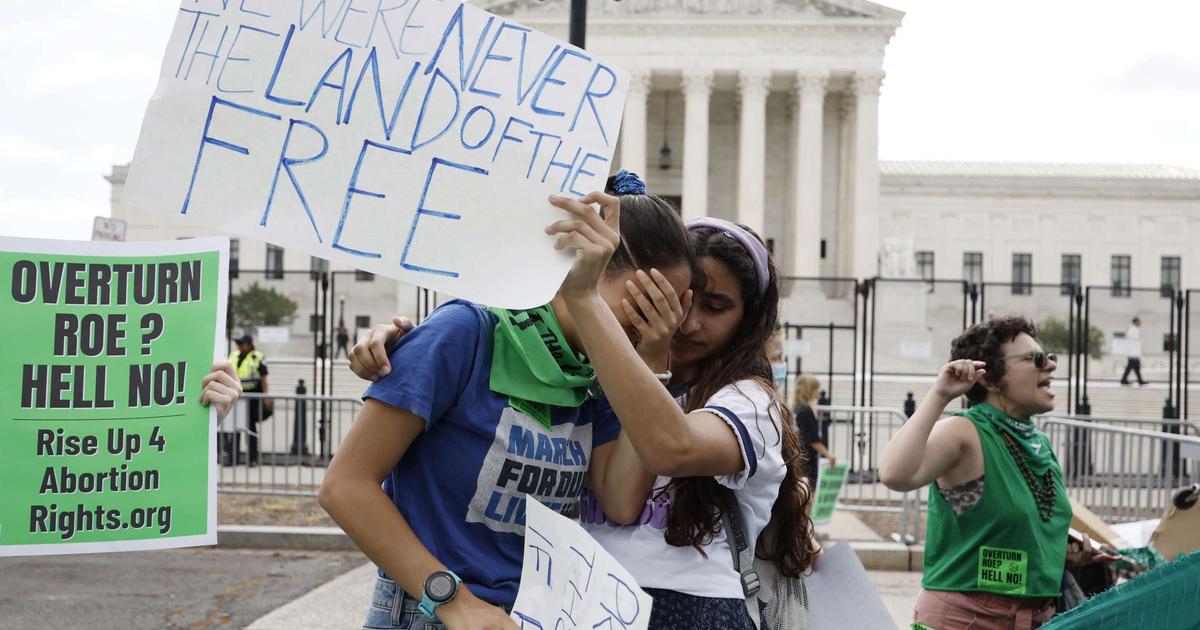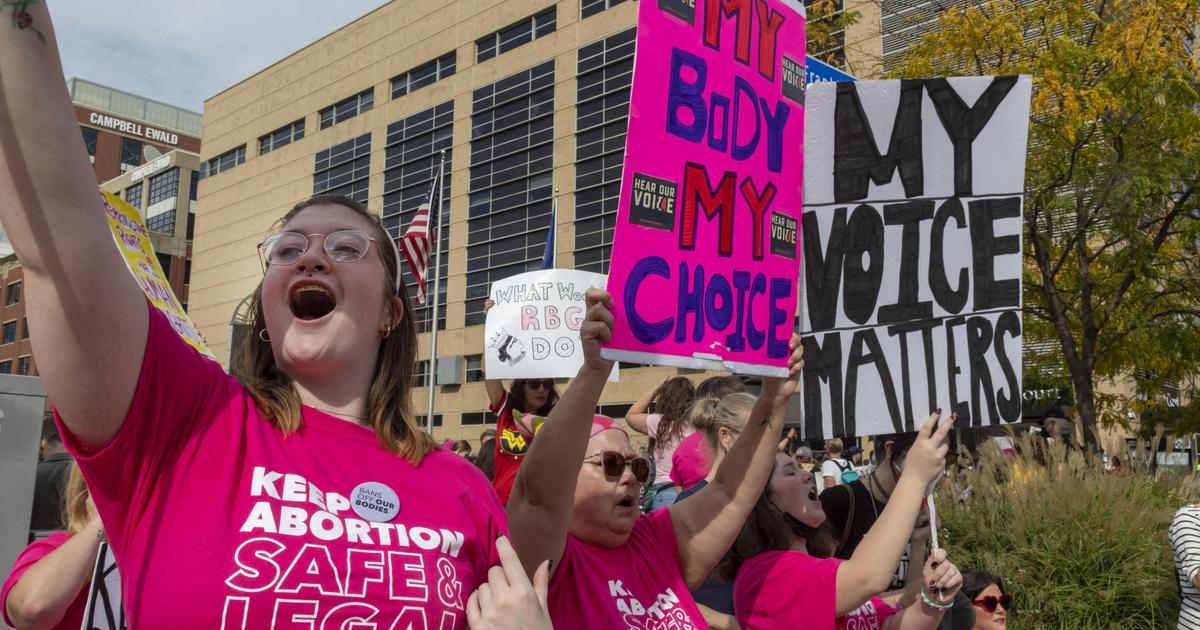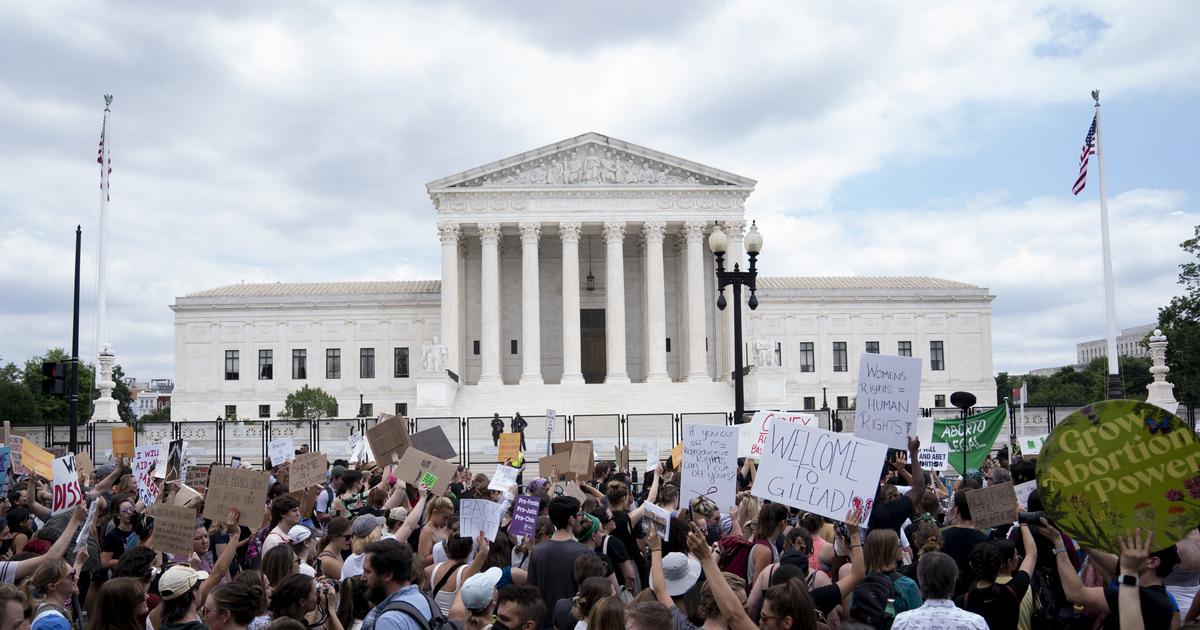The ax fell.
On Friday, June 24, just a day after ruling that states cannot legislate the carrying of weapons, the Supreme Court overturned the Roe vs. Wade precedent, which had established the federal right to abortion for 50 years. .
“We decide that Roe and Casey
(the decision that confirmed Roe vs Wade in 1992, Editor's note)
must be reversed”.
The position of the judges was already widely anticipated insofar as a draft of the final decision of the Supreme Court had already leaked on the American site Politico, at the beginning of May.
Read alsoThe Supreme Court of the United States repeals the constitutional right to abortion
A tragic mistake according to Biden, a call to Congress
However, such a reversal of jurisprudence has already caused a veritable tidal wave within society, pushing thousands of demonstrators into the streets of major American cities in recent weeks and before the Supreme Court, as soon as the decision is announced.
But also a political outcry.
Joe Biden immediately made a speech, referring to a “tragic error” by the Supreme Court which “endangers” the health of women.
He called on the US Congress to act to protect the right to abortion and urged Americans to vote for it in the
midterm elections.
next November.
Barack Obama also judged in a tweet that this decision "entrusts the most personal decision that anyone can make to the whim of politicians and ideologues - attacking the essential freedoms of millions of Americans".
On the other side of the spectrum, Congresswoman Beckie Curry, one of the authors of the Mississippi law, was celebrating "a happy day for all of us."
"I think God had it all in his hands from the start."
The governor of Texas, a state that has banned all abortion procedures after six weeks of pregnancy - as soon as a heartbeat can be heard - has promised that "Texas will always fight for the innocent unborn".
Donald Trump, who did not react officially, would nevertheless have regretted with those close to him a "bad" decision at the political level, for his Republican camp.
Read alsoAbortion rights canceled in the United States: Biden denounces a “tragic error”, Macron calls for “protecting” this “fundamental right”
In video, the demonstration in front of the Supreme Court of the United States which dynamizes the right to abortion
A “pro-family” position of the Conservatives
Because for several decades, the subject of abortion has been above all political in the United States and has confronted the conservative right with the liberals of the left.
Yet the issue of abortion has not always been partisan, rather it has been a matter of personal convictions.
It was during his 1972 presidential campaign that Richard Nixon was the first to take anti-abortion positions to win over Catholic voters.
"This change was intended to paint the Republican Party as pro-family, to help it engage conservative voters," says Linda Greenhouse, a Yale professor and co-author of the book
Before Roe vs. Wade .
.
On the side of the Democrats, the subject has long been difficult to decide.
In 1982, Joe Biden, a practicing Catholic, even judged it to be his "toughest vote as a senator", when he voted in favor of a constitutional amendment giving the states the right to overthrow Roe vs. Wade.
"I'm probably a victim or a product, in your words, of my background," he said at the time.
And during his presidential campaign ten years later, Bill Clinton weighs his words when he judges that abortion must remain "safe, legal and rare".
Elements of language that will even be taken up by Hillary Clinton during her own race for the White House in 2008.
Nine Almighty Judges
The context has largely changed since then, and abortion has become a banner for each political camp, the "pro-choice" on the Democratic side and the "pro-life" on the Republican side, with some exceptions.
And as it is up to the nine judges – appointed for life – of the Supreme Court to decide on the subject, the two parties have set about appointing members of their political sensitivity.
“The composition of the Supreme Court is the result of bad luck and a ruthless strategy of the Republicans”, Judge Carole Joffe, professor of constitutional law at the University of Wharton.
Republicans blocked Barack Obama's candidate for Congress for eight months before the 2016 election, and with a withdrawal and the death of Ruth Bader Ginsburg, Donald Trump was able to appoint three Supreme Court justices during his tenure,
making it largely switch to the side of the conservatives, six against three liberals.
What put a ban on abortion at the heart of the news, after only a year of session.
And this even though, according to the latest Gallup poll, 55% of Americans are in favor of abortion, the highest since 1995.
Abortion funds, abortion crowdfunding
Concretely, as soon as this decision is taken, 26 American states will adopt laws aimed at more or less strictly prohibiting abortion, which concerns 37 million women of childbearing age.
To deal with this increasingly significant threat, the Americans are mobilizing.
The polarization of states is palpable: 13 of them have adopted “trigger laws” which will amount to banning abortion as soon as the Supreme Court decides, while on the other side, the democratic states known as “blue states” are trying to expand access to abortion to women who live outside their state.
A Democratic stronghold, California is in the process of passing a series of laws to facilitate access to abortion and reduce its costs.
“The objective is to
ensure California is a state of reproductive freedom for all,” said Democrat Congresswoman Buffy Wicks, who told her own story of having an abortion at age 26.
Sign of the urgency of the situation, the state is one of those who voted to create an abortion fund, which allocates resources to local groups to help women finance their journey and their intervention.
"We are now doing abortion crowdfunding, with states and individuals making donations to help women travel and organize the logistics around their abortion," says Elizabeth Nash of the Guttmacher Institute research center.
The phenomenon has gained momentum with recent news, and the National Network of Abortion Funds (NNAF), which brings together more than 80 local abortion funds,
is also very active.
It organizes fundraisers and call centers to receive requests from women, and direct them.
Waiting rooms transformed into intervention rooms
In addition to the financial means, the States are working hard to increase the capacity of abortion centers.
For this is already the reality of abortion in the United States today: conservative states are tightening access and in the most flexible - the coastal states of the big cities to the west and east, Minnesota , New Mexico, Colorado and even Florida - switchboards are inundated with calls from women who want to travel so they can have an abortion after the deadline.
And the deadlines are getting longer, week by week.
It is therefore crucial to open up abortion to more practitioners.
In Connecticut and Maryland, for example, laws have been passed authorizing certified nurses, midwives, and physician assistants to perform procedures.
An ongoing effort in New Jersey, too, as the governor of California added $57 million to the budget to prepare abortion centers for an influx of patients.
"Having a legal right to care does not always mean that you have access to it," said Dan Rayfield, deputy spokesperson for Oregon, which has allocated $15 million to train staff, while the State shares a border with very conservative Idaho and expects a surge in visitation.
The centers are already working to make room: "In Colorado, Illinois or even Washington State, waiting rooms and offices have been transformed into intervention rooms, and women have to wait in their cars,” says Elizabeth Nash.
Companies are stepping up: Netflix, Starbucks, Levi's
Companies are not spared from this public debate, even if few of them have spoken on this hot and divisive subject.
"The business community is hesitant to come out of the woodwork politically, it does not want to anger the Republicans but it is also at heart to retain qualified women", explains Amanda Shanor, professor of law at the University of Wharton.
The Starbucks coffee group, which employs 240,000 people in the United States, has announced an extension of its health coverage to finance abortion-related travel in states where it would no longer be accessible.
The streaming service Netflix has introduced an envelope of 10,000 dollars per employee who would need to travel for certain treatments, including abortion.
Same decision on the part of the electric car manufacturer Tesla,
but also of Citi, the fourth bank in the country led by a woman, Jane Fraser.
What provoked the ire of Republicans: "Republicans must avoid entrusting their finances to Citibank and other companies that are hostile to their values," replied the president of the Republican Party of Texas, Matt Rimaldi.
At the beginning of May, Amazon announced that it would offer its employees $4,000 a year for the transportation costs of certain operations, including abortion.
But it was ratings site Yelp that was one of the few to openly attack the upcoming decision: "Reversing the progress women have made in the last 50 years will have a seismic impact on our society and our economy. ".
The CEO of the Match dating site, Shar Dubey, also spoke personally, and launched a fund to finance these transport expenses: “I do not speak as CEO.
I speak as a mother and a woman who cares about women's rights, including the fundamental right of choice over her body.
Finally,
Justine, three children in Wisconsin and an abortion in Illinois
But the reality is that the women most affected are not protected by secure jobs in these companies.
“50% of women having recourse to abortion are below the poverty line, 25% just above.
Many women will not be able to travel because they cannot afford it, especially if they already have children,” explains Carole Joffe, sociologist and author of several books on abortion.
Already, abortion is very difficult to access in republican states, known as “red states”, and women have been crossing borders for several years.
Missouri thus had only one clinic left, and in the city of Saint-Louis, women cross the Mississippi River to enter Illinois at Granite City, where there is a center.
VS'
is the same story told by Justine Pereira, a French mother of three in Wisconsin.
She got pregnant by accident and didn't get an appointment at Planned Parenthood until twelve days later.
Not wanting to wait, she and her husband turn to the border state of Illinois, where the woman is not required to watch the ultrasound, where there is no 24-hour withdrawal period and which has more centers.
"We were able to find a clinic that had an appointment the next day, but I was warned that there would be protesters there."
Health insurance does not pay for "chosen" abortions and in the end, her medical abortion will cost her $600.
“I was lucky enough to be able to do this trip and pay this bill,
but a lot of women can't afford it,” she says.
Especially since the costs can vary widely from one state to another: in Indiana, an abortion can cost 1,300 dollars.
Aid Access and the abortion pill
An alternative could be to obtain the abortion pill, useful up to 10 weeks pregnant, through other means.
It is actually two pills, which are taken 24 hours apart.
"Some women close to Mexico are already crossing the border to more easily obtain the main drug, which is enough most of the time to cause an abortion", explains Carole Joffe.
Founded in 2018 by Dutch doctor Rebecca Gomperts, the organization Aid Access sends pills by mail even to places where it is illegal, and is active in the United States.
After an online consultation, the doctor sends a prescription to the pharmacy in a state where telemedicine is legal, which ships the drugs.
Aid Access has already become essential in a post-Roe world:
within three months of the passage of the Texas abortion law, the group received three times as many requests a day from women in the state.
For Rebecca Gomperts, an ardent defender of reproductive rights, the solution is to have women legally prescribed the abortion pill without them being pregnant, so that they have this option.
And argues that you can't overdose on this drug, which is safe.
“Criminalization presents abortion as something bad.
Abortion is not a problem, it is something that people use to organize their lives (…) People are not asked why they want a child, and it has more impact on your life than an abortion ".
In Mississippi, the Jackson Women's Health Organization clinic - called the "pink house" - which opposed the state in the Supreme Court, made its decision.
Center Director Shannon Brewer announced, “We are planning to open a center in New Mexico.
We call it the West Pink House to tell people that we are always here for them, and that we will fight for women no matter what.”







/cloudfront-eu-central-1.images.arcpublishing.com/prisa/OCS7V4Q6YKB6UMI76BXPPNGQJE.jpg)






